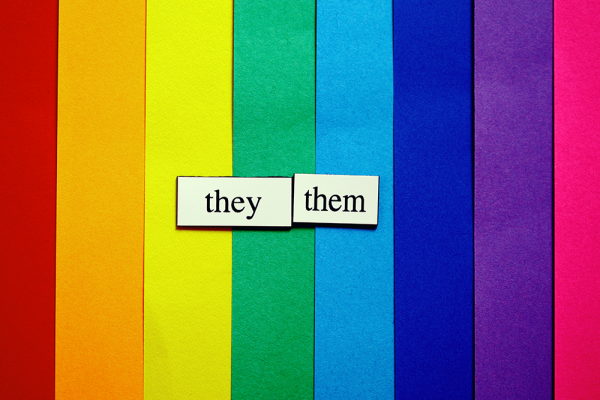Most English translations of the Bible use exclusively masculine pronouns to refer to God, and the presumed maleness of God has become the default mindset of many Christians. But does the precedence of masculine pronouns require Christians to refer to God only with masculine pronouns forever? As some have recently argued, the answer is yes: “He” and “him” are the only acceptable pronouns for God. But to me, this seems like insufficient evidence for such a definitive conclusion.
Since the Bible is a tool of God’s self-revelation, it’s important to consider all the ways that God is described in scripture and avoid focusing solely on the masculine pronouns ascribed to God. We must acknowledge that part of the reason the biblical text often describes God in masculine terms is because it was written in a hyper-patriarchal context where men were the most literate, powerful, and privileged population. Many of the biblical authors are unknown, but scholars believe much (if not all) of the Bible was written by men.
Despite the male-centric circumstance of the text, God is not defined strictly in masculine language. The Bible sometimes utilizes grammatically feminine words for God, such as ruach, which is the Hebrew word for God’s spirit. The writers of the Bible repeatedly compare God to a mother (Deuteronomy 32:11-12, 18; Psalm 131:2; Isaiah 42:14; 49:15; 66:13; Hosea 11:3-4; 13:8). In the gospels, Jesus likens himself to a mother hen wishing to protect her children in the safety of her wings (Matthew 23:37; Luke 13:34). Additionally, Jesus describes the Christ-character as a woman in the parable of the lost coin (Luke 15:8-10). These passages paint stunning and emotional portraits of God’s femininity.
Given both masculine and feminine descriptions of God in scripture, what pronouns are appropriate for us to ascribe to God? God is neither a man nor a woman, and yet God has both masculine and feminine characteristics. We need more expansive language to describe the truth and beauty of God.
I believe that they/them pronouns offer us several unique advantages for describing God’s nature and complex identity. Some consider “they” to be a genderless or gender-neutral pronoun, and it certainly can have that function. However, this is just one dimension of the word. Because “they” can refer to anyone of all genders, this also makes “they” the most gender-full pronoun or a pronoun full of gender possibilities! This creates a perfect opportunity to utilize “they” to describe the gender-expansiveness of God.
Some Christians resist the use of “they” as a pronoun for God, not on the basis of gender, but on the basis of the assumed grammatical plurality of the word. However, the semantic range of “they” is not a new development in the English language. English-speakers have routinely employed the singular they for centuries. Shakespeare and Jane Austen utilized the singular they in their works.
Although some traditionalists try to cling to the argument that they/them are strictly plural pronouns, this is a static and inaccurate view of language. Like all human inventions, language evolves with us. Year after year, we add new words, and definitions, and nuance to our dictionaries to reflect the gradual evolution of our language. The flexibility and adaptability of human beings is evident in the language we speak and, specifically in our case, in the dual singular/plural function of “they.”
Since the early days of church history, Christianity has affirmed that God is triune. God is both plural and singular, and Christians have often struggled to describe this three-in-one mystery — “neither blending their persons, nor dividing their essence” in the words of the Athanasian Creed. But they/them pronouns lend us a linguistic hand with our trinitarian theology because they have both plural and singular dimensions — just like God.
Not only are they/them pronouns well-suited to God because of their grammar and gender possibilities, but “they” also provides us with an opportunity to name one of the Christian faith’s most cherished beliefs: God is Creator.
The identity of God as a creational being is the first quality we name about them in the Bible. This divine creativity is sacred, and it’s something the Creator chose to share with their creation. As the pinnacle of all they had made, God says to themself, “let us make humanity in our image,” and creates human beings as a mirror of their divinity in the world (Genesis 1:26-27, emphasis added). God created a creative being who creates and recreates in the image of the Creator. By endowing humans with creativity, God makes it clear that the Bible is not God’s only tool of self-revelation; humanity is also an intrinsically revelatory vessel of God’s goodness, beauty, and love.
Humanity’s creativity and agency is a divine gift, and our diversity as people reflects the kaleidoscope of colors that make up the infinite splendor of God. And, after all, if God is the creator of all human beings of all genders, then wouldn’t God be the most gender-full, gender-creative being in the cosmos?
I believe that when we minimize or attempt to erase the gender-expansive nature of God, we put God in a box and actively limit our experience of God. Cutting off that piece of God is, by extension, cutting off that same part of humanity. Shrinking God shrinks us, too. But we don’t need to be afraid of a Creator who is bigger than a binary concept of gender.
Calling God “they” is a way of naming the divine enormity of their nature and being. When we do not have the language to express the boundless radiance of our Creator, “they” names an entire universe of possibility. I cannot think of a better way to honor the holy mystery of God — who is both known and unknown, seen and unseen, above us and beside us — than to name all that we know and all that we don’t know in the word “they.”
Got something to say about what you're reading? We value your feedback!






